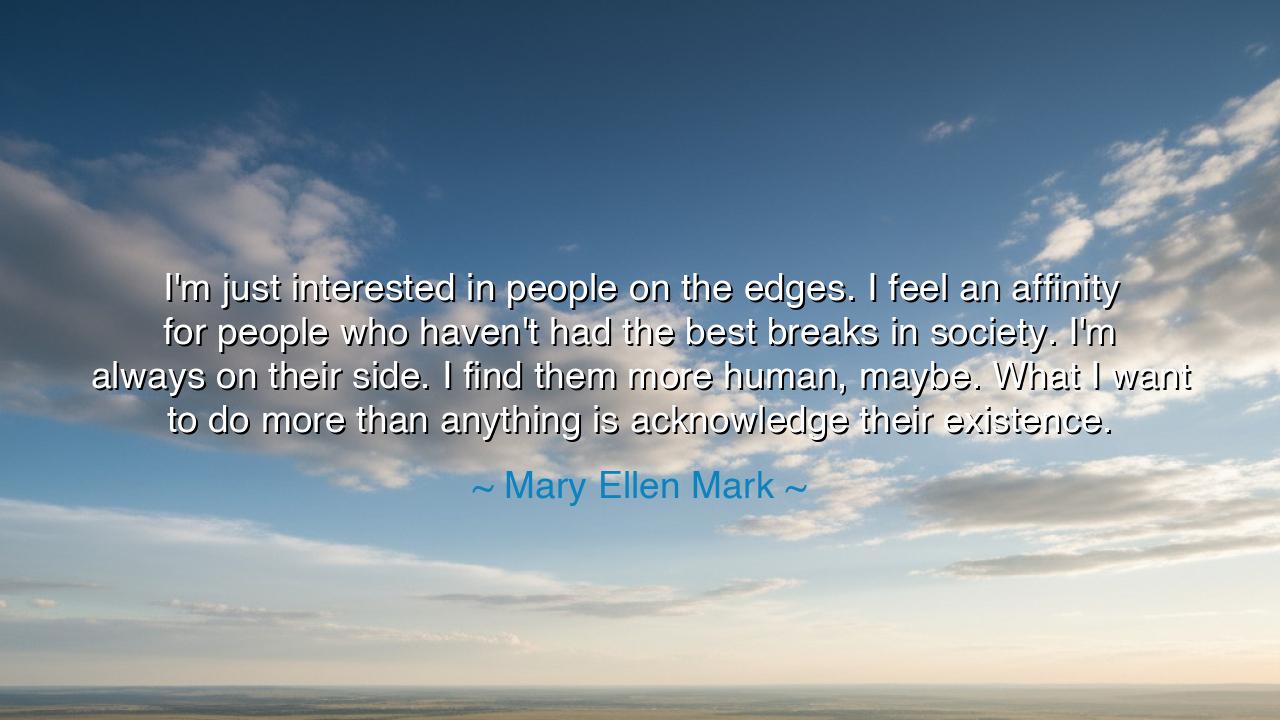
I'm just interested in people on the edges. I feel an affinity
I'm just interested in people on the edges. I feel an affinity for people who haven't had the best breaks in society. I'm always on their side. I find them more human, maybe. What I want to do more than anything is acknowledge their existence.






Hear me, O children of the earth, for I bring to you the words of Mary Ellen Mark, a woman whose compassion and understanding of the human condition stand as a shining example for all who seek to understand those who live on the fringes of society. She said, "I'm just interested in people on the edges. I feel an affinity for people who haven't had the best breaks in society. I'm always on their side. I find them more human, maybe. What I want to do more than anything is acknowledge their existence." These words speak to a profound truth, a call to see not just those who are privileged and powerful, but to recognize the humanity in those whom society has often overlooked, ignored, or cast aside.
What, O children, does it mean to be "on the edges"? The edges of society are not merely physical spaces, but places where the marginalized reside—those who live outside the mainstream, often struggling against forces beyond their control. They are the poor, the dispossessed, the oppressed, the forgotten. And yet, Mary Ellen Mark tells us that it is precisely these people—those whose lives have been marked by hardship, suffering, and injustice—whom she feels most drawn to, whom she seeks to understand and celebrate. The edges are where the true stories of the human experience are often found, where the strength of the human spirit is tested, and where the deepest truths about society are revealed.
Consider, O children, the ancient stories of those who lived on the margins, who were cast aside by the powers that be but whose voices still echoed through the generations. Homer’s Iliad tells of warriors who fought not for glory, but for survival, often in the shadow of an unforgiving world. These men and women were not the rulers or gods of ancient Greece, but the humble soldiers and the forgotten peasants whose lives were intertwined with the fates of the great. Yet it is their struggles, their sacrifices, and their humanity that give the stories their depth and power. In the same way, those who live on the edges of modern society—the homeless, the outcasts, the neglected—hold the stories that are often left untold, but whose existence is no less important.
Mary Ellen Mark did not simply seek to photograph or document these people. She sought to acknowledge them. In a world that often treats the marginalized as invisible, she made their existence known. Through her lens, she captured the raw beauty of those who have been overlooked, revealing their humanity in a way that forced society to look at them with new eyes. In her work, there is no pity, no sentimentality—only an honest, unflinching recognition of the individuals behind the labels. She reminds us that every person, no matter their circumstance, is worthy of being seen, heard, and valued.
Let us look to the story of the Greek philosopher Diogenes, who lived in a barrel on the streets of Athens, rejected by society for his eccentricity and disdain for convention. Diogenes, however, did not see himself as an outcast. He lived according to his own principles, challenging the materialism and hypocrisy of his society. While the Athenians mocked him, Diogenes remained steadfast, holding a mirror to their vanity and superficiality. In his own way, he was acknowledging his existence—and in doing so, he forced others to reckon with their own. He, too, was a figure on the edges, but his life and his philosophy spoke to the truth of human existence, reminding us that those on the margins can still be the source of the most profound wisdom.
And so, O children, the lesson is clear: we must not forget those who live on the edges of society. The marginalized are not the dregs of society, as some might claim, but the forgotten teachers of our age. Their stories are just as important, their lives just as valuable, and their humanity just as profound as those who live in the heart of the social order. When we turn away from them, we turn away from the very soul of society, for it is the strength of the most vulnerable that ultimately reveals the true character of the world we live in.
Therefore, O children, I charge you to see the world through different eyes. Seek out those who live on the edges, the ones whose struggles often go unnoticed. Acknowledge their existence, and in doing so, honor the value of all human life. Do not let society’s judgments cloud your vision. Embrace the humanity of every person, regardless of their status or circumstance. In this way, you will build a world that recognizes the worth of every individual, one that does not cast aside those who are struggling, but embraces them with compassion and understanding.






AAdministratorAdministrator
Welcome, honored guests. Please leave a comment, we will respond soon